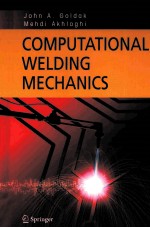图书介绍
COMPUTATIONAL WELDING MECHANICSPDF|Epub|txt|kindle电子书版本网盘下载

- 著
- 出版社: SPRINGER
- ISBN:0387232877
- 出版时间:2005
- 标注页数:321页
- 文件大小:53MB
- 文件页数:332页
- 主题词:
PDF下载
下载说明
COMPUTATIONAL WELDING MECHANICSPDF格式电子书版下载
下载的文件为RAR压缩包。需要使用解压软件进行解压得到PDF格式图书。建议使用BT下载工具Free Download Manager进行下载,简称FDM(免费,没有广告,支持多平台)。本站资源全部打包为BT种子。所以需要使用专业的BT下载软件进行下载。如BitComet qBittorrent uTorrent等BT下载工具。迅雷目前由于本站不是热门资源。不推荐使用!后期资源热门了。安装了迅雷也可以迅雷进行下载!
(文件页数 要大于 标注页数,上中下等多册电子书除外)
注意:本站所有压缩包均有解压码: 点击下载压缩包解压工具
图书目录
Chapter Ⅰ:Introduction1
1.1 Introduction and Synopsis1
1.2 Brief history of computational welding mechanics5
1.3 Mechanical behavior of welds8
1.4 Major objective of this book11
1.5 References11
Chapter Ⅱ:Computer Simulation of Welding Processes16
2.1 Introduction and Synopsis16
2.2 The Computing Environment18
2.2.1 Computational Geometry18
2.2.2 Models for Welding Heat Sources22
Theoretical Formulations22
Model Considerations24
Gaussian Surface Flux Distribution26
Hemi-spherical Power Density Distribution30
Ellipsoidal Power Density Distribution30
Double Ellipsoidal Power Density Distribution32
2.2.3 Kinematic Models for Welding Heat Transfer35
2.2.4 Evaluation of the Double Ellipsoid Model43
2.2.5 Modeling Thermal Stresses and Distortions in Welds51
2.2.6 Microstructure Modeling in Heat Affected Zone (HAZ)59
2.2.7 Spatial Integration Schemes63
2.3 References64
Chapter Ⅲ:Thermal Analysis of Welds71
3.1 Introduction and Synopsis71
3.2 Heat Transfer Theory74
3.3 Weld Heat Source76
3.3.1 Data to characterize a Weld Heat Source77
3.3.2 Modeling a Weld Heat Source79
First Generation Weld Heat Source Models80
Second Generation Weld Heat Source Models81
Distributed Heat Source Models83
Prescribed Temperature Heat Source Models83
Third Generation Weld Heat Source Models84
Fourth Generation Weld Heat Source Models85
Fifth Generation Weld Heat Source Model86
Hierarchical Weld Process Models87
3.4 Heat Transfer in Welds87
3.4.1 Power Input89
3.4.2 Implementation of prescribed temperature model93
3.4.3 Starting Transient94
3.4.4 Boundary Conditions95
3.4.5 Finite Element Solutions with Prescribed Temperature98
3.4.6 Computational Results100
Complex Weld Pool Shape100
Welds with Filler Metal Addition108
3.5 References115
Chapter Ⅳ:Evolution of Microstructure Depending On Temperature119
4.1 Introduction and Synopsis119
4.2 Microstructure Model124
4.2.1 Data Structures131
Flow lines131
Functionality of the Data Structure132
Layered tree description132
Locating elements135
Creating flow lines136
4.2.2 Test Problems and Results138
Steady State Temperature Field140
Clipped transient temperature field143
4.3 Hardness Calculation of the HAZ148
4.4 References149
Chapter Ⅴ:Evolution of Microstructure Depending On Deformations153
5.1 Introduction and Synopsis153
5.2 Properties for Modeling158
5.2.1 Stresses,Strains and Deformations162
5.2.2 Rate Independent Isotropic Plasticity168
Steady-State Formulation169
Deformation172
Strain Increment Measurement174
Numerical Results176
5.2.3 Linear Viscous Isotropic Plasticity around melting pt183
5.2.4 Rate dependent isotropic plasticity (General case)184
5.2.5 Changing Constitutive Equations in Time and Space185
5.2.6 Numerical Experiments and Results186
5.3 References195
Chapter Ⅵ:Carburized and Hydrogen Diffusion Analysis199
6.1 Introduction and Synopsis199
6.2 Carburization; Theory and Numerical Methods203
6.2.1 Thermal,Microstructure and Stress Analysis210
Thermal Analysis210
Microstructure Analysis211
Thermal Stress Analysis211
Coupling Thermal,Microstructure and Stress Analysis212
Test212
Task Sequence213
Structure and Materials214
Deposition of Welds214
FEM Mesh215
Results and Discussion217
6.3 Hydrogen Diffusion in Welds226
6.3.1 Fundamental Equation228
6.3.2 Preheat prediction232
6.3.3 Computational Analysis238
6.4 References244
Chapter Ⅶ:Welded Structures and Applications of Welding in Industrial Fields247
7.1 Introduction and Synopsis247
7.2 Weld Procedure249
7.3 Weld Joint251
7.4 Analysis of a Weld Structure252
7.5 Real-Time for CWM266
7.5.1 Current Performance for CWM269
7.5.2 Implications of real-time CWM271
7.6 References273
Chapter Ⅷ:Fracture Mechanics277
8.1 Introduction and Synopsis277
8.2 Review and Model Development283
8.3 Discussion300
8.4 References302
Chapter Ⅸ:Input Data for Computational Welding Mechanics305
9.1 Introduction and Synopsis305
9.2 Structure to be Welded305
9.3 Weld Procedure307
9.4 Thermal Analysis Outside the Weld Pool308
9.5 Microstructure Evolution308
9.6 Thermal Stress Analysis Outside the Weld Pool309
9.7 Weld Pool Solver310
9.8 Material Properties Summary311
9.9 Visualization312
9.10 Fracture Mechanics of Welded Structures312
Index315